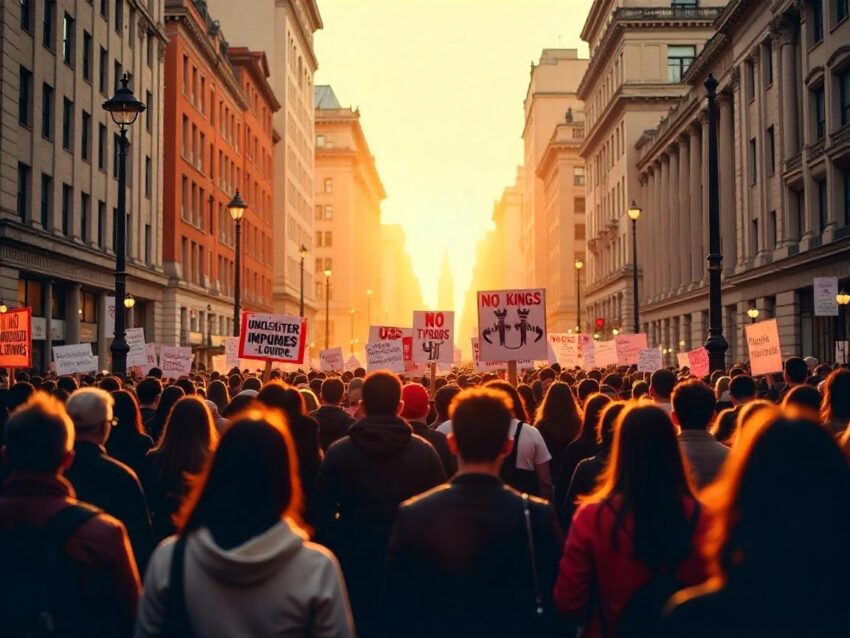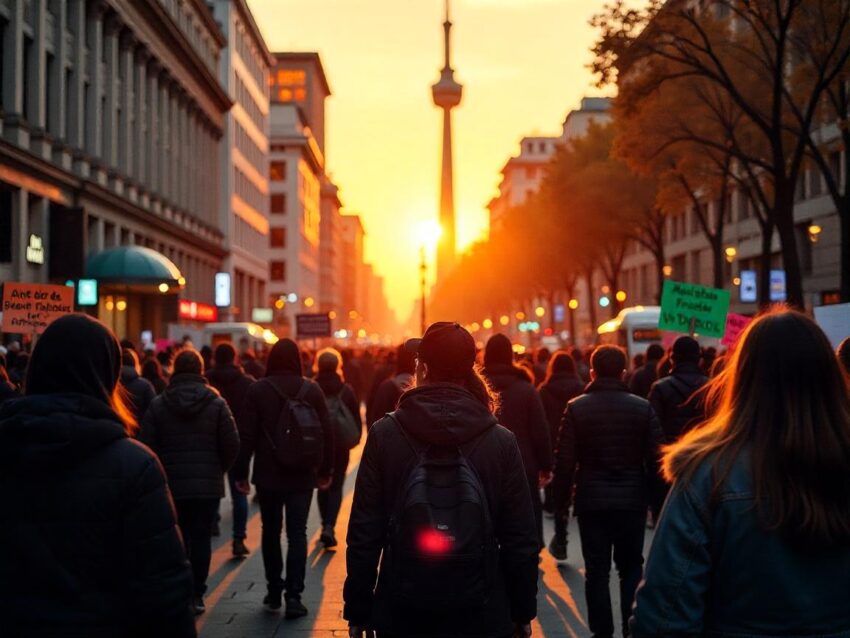Mexico and Canada Unite with US, Japan, Germany, Colombia, Italy, Portugal, Spain and Many More Countries in Supporting No Kings Protest and it Becomes Global, How Travel Gets Impact This Weekend
This weekend, a wave of disruption is sweeping across borders as Mexico and Canada unite with the US, Japan, Germany, Colombia, Italy, Portugal, Spain, Sweden, the UK, and the Netherlands in a powerful show of support for the No Kings protest.
This weekend, a wave of disruption is sweeping across borders as Mexico and Canada unite with the US, Japan, Germany, Colombia, Italy, Portugal, Spain, Sweden, the UK, and the Netherlands in a powerful show of support for the No Kings protest. What started as a domestic movement has now exploded into a global phenomenon, sending shockwaves through the travel world. Suddenly, streets are flooded, embassy zones locked down, and flights rerouted. Meanwhile, travelers are caught in the middle—unsure where it’s safe to go or how long it will last.
No Kings is no longer just a slogan—it’s a movement rewriting global headlines. As travel plans unravel and cities brace for more unrest, the energy on the ground is electric. Something big is unfolding. And with Canada, Mexico, and global powerhouses like Germany and Japan now in sync, the suspense is real. What’s driving this weekend’s global unrest—and how will it reshape your travel plans?
| Country | City Examples | Event Label | Travel Tip |
|---|---|---|---|
| Canada | Toronto | No Tyrants | Monitor U.S. Consulate advisories |
| Mexico | Mexico City | No Tyrants | Avoid embassy zones, expect crowd traffic |
| Colombia | Bogotá | No Tyrants | Watch transport timing around events |
| Germany | Berlin, Hamburg | No Tyrants | Use official updates for street closures |
| Italy | Rome, Milan | No Kings | Time visits to cultural sites |
| Portugal | Porto | No Dictators | Check metro closures |
| Spain | Barcelona | No Dictators | Book restaurants outside protest zones |
| Sweden | Stockholm | No Kings | Opt for pre-booked tours |
| UK | London | No Tyrants, No Kings | Expect embassy route closures |
| Netherlands | Amsterdam | No Tyrants | Ride-share pick-up may be impacted |
| Japan | Tokyo | No Crowns! No Kings | Avoid central government districts |
| Malawi | Nationwide | No Kings (local styling) | Check local news and transport options |
| Switzerland | Bern, Geneva, Zurich | No Kings | Embassy district monitoring |

Worldwide Unrest, Real-Time Impact: What the “No Kings” Movement Means for Global Travelers Now
A coordinated wave of “No Kings” and “No Tyrants” protests struck over 2,000 U.S. cities and quickly echoed across more than a dozen countries on June 14, 2025. What began as a domestic outcry against perceived authoritarianism has now evolved into a full-scale global movement—with direct consequences for international travel, tourism flow, and urban mobility.
Travelers and tourism professionals are already feeling the ripple effects. From blocked access to U.S. embassies and heightened security zones to metro delays and rescheduled cultural events, this global uprising has shifted the dynamics of international movement—requiring vigilance and flexibility.
Protests Reach Critical Mass Across Travel-Heavy Nations
In Canada, Mexico, Colombia, and several EU nations, travelers woke up to rerouted transit lines, crowded embassy districts, and advisories urging caution. In Toronto, the movement—renamed “No Tyrants”—gathered momentum near the U.S. consulate, sparking peaceful demonstrations but also triggering temporary access restrictions in key downtown areas.
Meanwhile, Mexico City and Bogotá saw similar mobilizations. Streets near U.S. buildings filled with demonstrators voicing fears of authoritarian drift. For travelers, these gatherings led to ride-share cancellations, closed metro exits, and increased security checks at hotels and government buildings.
Tourism authorities are monitoring real-time shifts in foot traffic, especially in Rome, Milan, Berlin, and Barcelona—major cities where political protests traditionally merge with tourist hotspots. Hotel operators in Milan, for example, reported same-day cancellations as American travelers rerouted their plans away from potential flashpoints.

Airport and Embassy Zones: Now Unpredictable Ground Zeroes
Airports and embassy-adjacent areas have become logistical landmines for international tourists. Berlin’s Tegel and Hamburg Airports reported minor slowdowns due to overflow from inner-city protests, while public transport providers in Stockholm, Amsterdam, and London issued real-time alerts to avoid bottlenecks.
The U.S. embassy in London—long a magnet for global demonstrations—was the site of carefully branded “No Tyrants” events. Though peaceful, the surrounding areas experienced closures, snaking queues, and detours for both locals and visitors. Ride-share pick-up points were disabled for hours in central Amsterdam during peak protest hours.
For air travelers, it’s not just about delays—it’s about missed transfers, overwhelmed local transit, and altered hotel check-ins. Airlines with routes into these cities began issuing advisories, recommending that passengers arrive early and prepare for unpredictable wait times between airport terminals and city centers.
Hotels, Events, and Tourist Experience: A New Set of Disruptions
Hotels in affected cities are quickly adjusting. In Zurich and Geneva, front desk managers reported surges in early check-outs and route change requests. Rome’s boutique hotels near Piazza Venezia recommended guests skip historic city walking tours during protest hours to avoid being caught in the crowds.
In Porto and Barcelona, outdoor cultural events faced rescheduling or relocation. Authorities in both cities encouraged organizers to avoid overlapping with political demonstrations, citing crowd safety and traffic access.
Meanwhile, tour operators in Tokyo pivoted their messaging. With the movement rebranded as “No Crowns! No Kings!” in Japan, tour companies adapted by offering modified city tours that avoid government buildings or high-security zones altogether.
Democratic Messaging Meets Tourism Risk: The New Dilemma for Travelers
The core message of the “No Kings” protests—opposing authoritarian influence and defending democratic values—has struck a global chord. But for travelers, it introduces an evolving risk landscape. Cultural solidarity is one thing; being stuck behind a police cordon or locked embassy gate is another.
The concern is not violence—so far, protests have remained overwhelmingly peaceful—but unpredictability. Demonstrations may be announced hours before or emerge spontaneously based on local events, creating ripple effects across transport, business hours, and public access.
Tourism analysts now advise that travel planning must go beyond weather and visas. Real-time protest tracking, embassy alert subscriptions, and flexible itineraries are becoming the new essentials for savvy international travelers.
American Travelers Abroad: A Wake-Up Call in Foreign Lands
For Americans traveling overseas, the symbolism cuts deeper. The “No Kings” movement may originate at home, but its international reach means they are also viewed through the lens of U.S. policy critiques. Many events were organized by Democrats Abroad, but drew crowds of diverse backgrounds, uniting under a concern for democratic backsliding.
As a result, American tourists are urged to exercise cultural sensitivity. Local protest messaging may be directed at U.S. governance, but the demonstrations themselves often align with broader global calls for fairness, accountability, and civil rights. Participating without full knowledge may be risky, while dismissing the events entirely could come across as tone-deaf.
What Travel Leaders and Industry Insiders Are Doing
The travel industry is adapting—fast. Airlines are updating their app notifications to include civil unrest warnings. Major hotel chains like those in the IHG and Marriott groups are issuing concierge advisories for guests arriving in protest-affected cities. Some luxury resorts near embassy zones are even offering protest-free shuttle services.
Tourism authorities in cities like Berlin, Milan, and London are working closely with local police and event organizers to strike a balance between democratic expression and public mobility. They’re aiming to safeguard both free speech and travel flow—a delicate, high-stakes dance.
Bottom Line: Stay Aware, Stay Flexible, Stay Respectful
The global “No Kings” protests are more than just a political moment—they’re a travel reality. For vacationers, business travelers, and digital nomads, this new normal means preparing for more than just weather and Wi-Fi. It’s about understanding the world’s emotional temperature—and adjusting accordingly.
International travelers must stay plugged in. Monitor embassy notices. Track hashtags like #NoKings and #NoTyrants. Use local transport apps. Stay out of gathering zones when possible—and never assume yesterday’s itinerary will still work tomorrow.
This isn’t a call to cancel. It’s a call to travel smarter, with eyes wide open.
Thousands poured into city streets across America—Grand Rapids, New York City, Los Angeles, Chicago, Seattle, Houston, Phoenix, and Colorado—for the sweeping “No Kings” protest on June 14, 2025. What started as a crowd demanding democracy has suddenly turned into an unexpected travel blow. Airports remain open, but roads have closed. Hotel lobbies are jammed. Visitors in transit are stuck. Travelers from across the world face their summer plans derailed.
In Grand Rapids, Michigan, a peaceful march from Rosa Parks Circle through Monroe Avenue NW became the city’s largest public demonstration. Hotels in the downtown core scrambled to issue alerts. Meanwhile, New York City’s subway stations near Times Square were rerouted. In Los Angeles, freeway ramp closures disrupted rideshare pickups. Chicago’s Loop district saw street-level disruptions. Seattle, Houston, Phoenix, and Colorado also reported unexpected gridlock, police checkpoints, and local transit detours.
These protests are not isolated. Travelers are caught off guard as transit apps flash red alerts. Hotels report surge in temporary cancellations. Airports are braced for transport chaos. Rental cars are in high demand as public routes falter. Meanwhile, tour operators scramble to reroute sightseeing buses.
Urban Centers Face Major Travel Strains
New York City / Los Angeles / Chicago / Seattle / Houston / Phoenix / Colorado
These were epicenters of protest activity, drawing thousands and disrupting key travel corridors. Subway lines near central avenues saw delays. Ride-shares were rerouted. Alternate routes became congested, and tourist landmarks faced limited access. Hotels in downtown cores faced guest complaints and last-minute rebookings. Tour guides paused operations amid crowd surges. As a result, travel demand shifted to suburbs and quieter cities.
Traveler tip: Expect transit delays. Use ride-share pick-ups outside protest areas—even a few blocks can save hours.
Grand Rapids Shines (and Warps)
Until June 14, Grand Rapids flew below the radar of major summer travel. But now, it’s center stage. Riverside attractions, beer trails, and museums face traffic snarls. Local hotels had to activate security updates. Some blocked off adjacent streets. Tour buses were rerouted out of downtown. Airport shuttle services rerouted outside protest zones. What was once a minor travel destination is now defined by protest energy—and travel caution.
Traveler tip: Stay updated via Waze or Google Maps. Plan pick-up/drop-off points outside protest zones or opt for walking tours.
Transit Services Reroute & Reassess
Cities responded quickly—with rerouting orders and transport warnings. In Seattle, Light Rail temporarily bypassed downtown stations. In Houston, METRO buses halted stops along demonstration routes. Phoenix rerouted local buses around protest zones. Colorado highways experienced intermittent closures near Denver, Boulder, and Colorado Springs.
Airport shuttles adjusted their stands. Ride-share apps issued pop-up alerts about street closures. Travelers were left stranded and frustrated. As these transit shifts ripple across urban cores, tourists must revise plans—quickly.
Traveler tip: Have backup transit options. Book rental cars early and locate pick-ups out of city centers. Expect to walk longer than planned.
Hotels Under Siege
Downtown hotels from Grand Rapids to LA have seen their lobbies flooded—not with tourists, but by people seeking shelter from crowds. Check-in counters backed up. Valet lines snaked onto sidewalks. Kitchens delayed orders. Conference rooms once booked for summer weddings or business events were impacted. Some events relocated last minute to hotels outside protest zones.
Hotels are now communicating with guests— alerting them not to carry large bags, advising on transport delays, and offering shuttle services to quieter districts.
Traveler tip: Choose accommodations at least two miles from protest zones. Confirm shuttle or parking options before booking.
Airports Still Ticking—But At Risk
Airport operations remain uninterrupted, but surrounding traffic jams pose an emergency risk. Travelers arriving into LGA, LAX, ORD, SEA, IAH, PHX, and DEN must contend with blocked roads on routes from airports into the city. Rental cars and airport shuttles face the same issues.
Airports have extended their ground crew hours to manage the overflow and stay operable. But if you’re arriving during peak protest times, plan extra ground-time or use alternate transport like park-and-ride.
Traveler tip: Book flights with later arrival times. Use airport parking or pickup zones outside protest areas.
A New Travel Stress Test
The “No Kings” protests above were peaceful. Still, they stress-test travel systems built for leisure—not activism. Rerouted transport, blocked streets, and tightened hotel check-ins are changing the travel experience.
These protests also show a new layer of travel risk—political movement intersecting with summer tourism. While airports remain open, highways collapse. And hotel escalations will haunt summer stayers. Tour operators are revising summer itineraries. Travelers are canceling mid-journey. Emergency transportation options are gaining sudden value.
Industry Scramble: Operators, Airlines, Hotels Adapt
- Ride-share apps instantly updated pick-up spots and yielded high prices in diverted zones.
- Tour companies revised travel maps; city tours became rural tours.
- Hotels rerouted guest baggage through alternate entrances.
- Rental firms raised prices tenfold amid demand for car freedom.
- Airports bolstered staff to control ground crowding.
What Travelers Should Know—and Do Now
- Anticipate delays: Tourists must allow extra time for transfers and rideshares.
- Stay informed: Apps, radio, and local news are essential.
- Choose lodging wisely: Avoid hotels in protest zones; expect shuttle services.
- Use secure corridors: Walk in pairs and use designated tourist routes.
- Embrace unpredictability: Summer travel needs flexibility.
The Big Picture: Democracy, Demonstrations—and Travel
The “No Kings” uprisings demonstrate American civic energy. But they’ve also triggered travel turbulence. These protests are testing tourism’s resilience under social strain. Just as skies stay open, roads collapse. As long as protests continue, travelers must navigate via awareness, flexibility, and smart planning.
Expect this summer to be unlike any other. Grand Rapids and the major metros now share the spotlight for more than vacation—they’re testaments to shifting travel landscapes.
The post Mexico and Canada Unite with US, Japan, Germany, Colombia, Italy, Portugal, Spain and Many More Countries in Supporting No Kings Protest and it Becomes Global, How Travel Gets Impact This Weekend appeared first on Travel and Tour World


